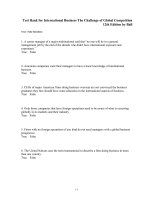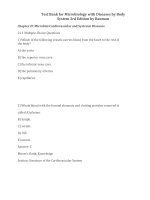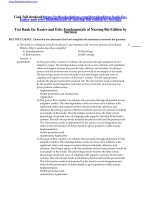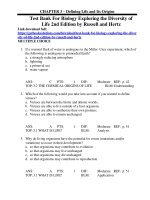Download test bank for biology exploring the diversity of life 2nd edition
Bạn đang xem bản rút gọn của tài liệu. Xem và tải ngay bản đầy đủ của tài liệu tại đây (431.92 KB, 16 trang )
CHAPTER 3 – Defining Life and Its Origins
Test Bank For Biology Exploring the Diversity of
Life 2nd Edition by Russell and Hertz
Link download full:
/>sity-of-life-2nd-edition-by-russell-and-hertz
MULTIPLE CHOICE
1. If a warmed flask of water is analogous to the Miller–Urey experiment, which of
the following is analogous to primordial Earth?
a. a strongly reducing atmosphere
b. lightning
c. a primeval sea
d. water vapour
ANS:
C
PTS:
1
DIF:
TOP: 3.2 THE CHEMICAL ORIGINS OF LIFE
Moderate REF: p. 42
BLM:Understanding
2. Which of the following would you take into account if you wanted to define
viruses?
a. Viruses are between the biotic and abiotic worlds.
b. Viruses are able to live outside of a host organism.
c. Viruses are able to synthesize their own proteins.
d. Viruses are able to remain unchanged.
ANS:
A
PTS:
TOP: 3.1 WHAT IS LIFE?
1
DIF:
BLM:
Moderate REF: p. 51
Analysis
3. Why do living organisms have the potential for errors (mutations and/or
variations) to occur in their development?
a. so that organisms may contribute to evolution
b. so that organisms may live unchanged
c. so that organisms may die unchanged
d. so that organisms may contribute to reproduction
ANS:
A
PTS:
TOP: 3.1 WHAT IS LIFE?
1
DIF:
BLM:
Moderate REF: p. 51
Application
4. Which of the following describes the order of emergence of various organisms
on Earth?
a. land plants, first prokaryotes, animals, first eukaryotes, humans
b. first prokaryotes, first eukaryotes, animals, land plants, humans
c. animals, first prokaryotes, first eukaryotes, land plants, humans
d. humans, animals, land plants, first eukaryotes, first prokaryotes
ANS:
B
PTS:
1
DIF:
TOP: 3.2 THE CHEMICAL ORIGINS OF LIFE
Moderate REF: p. 53
BLM:Synthesis
5. How old is Earth?
a. about 4.6 million years
b. about 3.6 billion years
c. about 4.6 billion years
d. about 1 billion years
ANS:
C
PTS:
1
DIF:
TOP: 3.2 THE CHEMICAL ORIGINS OF LIFE
Easy REF: p. 53
BLM:Knowledge
6. Which of the following factors is the most important requirement in order for
life to emerge?
a. the presence of liquid water
b. the presence of air
c. the presence of soil
d. the presence of sunlight
ANS:
A
PTS:
1
DIF:
TOP: 3.2 THE CHEMICAL ORIGINS OF LIFE
Moderate REF: p. 54
BLM:Analysis
7. In the 1920s Aleksander Oparin and John Haldane each made independent
proposals about the formation of life on Earth. What did they say about essential
organic molecules?
a. that these could not have been made in the absence of life in the
conditions on primordial Earth
b. that these could have been made in the presence of life only in the
conditions on primordial Earth
c. that these could have been made in the absence of life only in the
conditions on primordial Earth
d. that these could have been made in the absence of life only in the
conditions on modern Earth
ANS:
C
PTS:
1
DIF:
TOP: 3.2 THE CHEMICAL ORIGINS OF LIFE
Difficult REF: p. 55
BLM:Knowledge
8. Alexander Oparin and John Haldane postulated that the early atmosphere was a
reducing atmosphere. Why was this prediction an important one?
a. because the molecules contain the maximum possible number of
protons that can be easily donated in reactions that lead to synthesis of
complex molecules
b. because the molecules contain the minimum possible number of
electrons that can be easily donated in reactions that lead to synthesis
of complex molecules
c. because the molecules contain the maximum possible number of
protons that can be easily accepted in reactions that lead to synthesis of
complex molecules
d. because the molecules contain the maximum possible number of
electrons that can be easily donated in reactions that lead to synthesis
of complex molecules
ANS:
D
PTS:
1
DIF:
TOP: 3.2 THE CHEMICAL ORIGINS OF LIFE
Difficult REF: p. 55
BLM:Comprehension
9. What is the importance of the Miller-Urey experiment?
a. It showed that molecules crucial to life could be produced biotically.
b. It showed that molecules crucial to life could be produced abiotically.
c. It showed that unimportant molecules could be produced biotically.
d. It showed that unimportant molecules could be produced abiotically.
ANS:
B
PTS:
1
DIF:
TOP: 3.2 THE CHEMICAL ORIGINS OF LIFE
Easy REF: p. 55
BLM:Comprehension
10. If an electrode is analogous to the Miller–Urey experiment, which of the
following is analogous to primordial Earth?
a. water vapour
b. a strongly reducing atmosphere
c. lightning
d. a primeval sea
ANS:
C
PTS:
1
DIF:
TOP: 3.2 THE CHEMICAL ORIGINS OF LIFE
Moderate REF: p. 56
BLM:Understanding
11. If a condenser is analogous to the Miller–Urey experiment, which of the
following is analogous to primordial Earth?
a. a primeval sea
b. water vapour
c. cold temperature
d. lightning
ANS:
C
PTS:
1
DIF:
TOP: 3.2 THE CHEMICAL ORIGINS OF LIFE
Moderate REF: p. 56
BLM:Understanding
12. Which of the following is in the correct sequence?
a. the origin of self-replicating molecules — the abiotic synthesis of
small molecules — the abiotic synthesis of polymers — packaging of
molecules into protobionts
b. packaging of molecules into protobionts — the abiotic synthesis of
small molecules — the abiotic synthesis of polymers — the origin of
self-replicating molecules
c. the abiotic synthesis of polymers — the abiotic synthesis of small
molecules — packaging of molecules into protobionts — the origin of
self-replicating molecules
d. the abiotic synthesis of small molecules — the abiotic synthesis of
polymers — packaging of molecules into protobionts — the origin of
self-replicating molecules
ANS:
D
PTS:
1
DIF:
TOP: 3.2 THE CHEMICAL ORIGINS OF LIFE
Moderate REF: p. 57
BLM:Analysis
13. What are protobionts?
a. a group of abiotically produced organic molecules surrounded by a
membrane-like structure
b. a group of biotically produced inorganic molecules surrounded by a
membrane-like structure
c. a group of biotically produced organic molecules surrounded by a
membrane-like structure
d. a group of abiotically produced inorganic molecules surrounded by a
membrane-like structure
ANS:
A
PTS:
1
DIF:
Moderate REF: p. 57
TOP: 3.3 FROM MACROMOLECULES TO LIFE BLM:
Knowledge
14. Which of the following statements would describe prokaryotic cells?
a. They cells are not ten times smaller than typical eukaryotic cells.
b. They do not vastly outnumber all other types of organisms.
c. They are not less versatile biochemically than eukaryotes.
d. They do not have much less internal membrane organization than
eukaryotes.
ANS:
C
PTS:
1
DIF:
Moderate REF: p. 58
TOP: 3.3 FROM MACROMOLECULES TO LIFE BLM:
Comprehension
15. What contributes to evolutionary change over time?
a. changes in RNA
b. changes in DNA
c. changes in proteins
d. changes in cells
ANS:
B
PTS:
1
DIF:
Moderate REF: p. 58
TOP: 3.3 FROM MACROMOLECULES TO LIFE BLM:
Knowledge
16. What is the flow of information that the central dogma refers to?
a. DNARNAprotein
b. DNAproteinRNA
c. RNAproteinDNA
d. RNADNAprotein
ANS:
A
PTS:
1
DIF:
Easy REF: p. 58
TOP: 3.3 FROM MACROMOLECULES TO LIFE BLM:
Knowledge
17. Which property of RNA makes some RNA molecules able to act as catalysts?
a. that they are single-stranded molecules which can fold into very
specific shapes
b. that they are single-stranded molecules which cannot fold into very
specific shapes
c. that they are double-stranded molecules
d. that they are double-stranded molecules which can fold into very
specific shapes
ANS:
A
PTS:
1
DIF:
Moderate REF: p. 58
TOP: 3.3 FROM MACROMOLECULES TO LIFE BLM:
Analysis
18. Why was ATP a primary molecule in connecting energy-releasing and
energy-requiring reactions in early cells?
a. because it was the only molecule available to transfer energy
b. because of its versatility and efficiency in transferring energy
c. because of its structure
d. because of its attraction to energy
ANS:
B
PTS:
1
DIF:
Moderate REF: p. 60
TOP: 3.3 FROM MACROMOLECULES TO LIFE BLM:
Comprehension
19. From which of the following processes did the first oxygen come from?
a. aerobic respiration
b. oxidizing water
c. anaerobic respiration
d. fermentation
ANS:
B
PTS:
1
DIF:
TOP: 3.4 THE EARLIEST FORMS OF LIFE
Moderate REF: p. 62
BLM:Knowledge
20. When were the oldest stromatolites formed?
a. about 2.1 billion years ago
b. about 4.2 billion years ago
c. about 3.5 billion years ago
d. about 3.9 billion years ago
ANS:
C
PTS:
1
DIF:
Moderate REF: p. 62
TOP: 3.3 FROM MACROMOLECULES TO LIFE BLM:
Knowledge
21. Which sentence describes the panspermia hypothesis?
a. Life on Earth could have started abiotically.
b. Life on Earth could have started biotically.
c. Different forms of life were present in outer space but these may not
have seeded early Earth.
d. Very simple forms of life were present in outer space and these may
have seeded early Earth.
ANS:
D
PTS:
1
DIF:
TOP: 3.4 THE EARLIEST FORMS OF LIFE
Easy REF: p. 62
BLM:Knowledge
22. What are the major membrane components in a eukaryotic cell?
a. the nuclear envelope, the endoplasmic reticulum, and chloroplasts
b. the nuclear envelope, the endoplasmic reticulum, and mitochondria
c. the nuclear envelope, the endoplasmic reticulum, and the Golgi
complex
d. the nuclear envelope, mitochondria, and chloroplasts
ANS:
C
PTS:
1
DIF:
Moderate REF: p. 64
TOP: 3.5 THE EUKARYOTIC CELL AND THE RISE OF
MULTICELLULARITY
BLM:
Knowledge
23. What is the name of the process by which mitochondria and chloroplasts
probably evolved?
a. endocytosis
b. endosymbiosis
c. exocytosis
d. exosymbiosis
ANS:
B
PTS:
1
DIF:
Easy REF: p. 65
TOP: 3.5 THE EUKARYOTIC CELL AND THE RISE OF
MULTICELLULARITY
BLM:
Knowledge
24. What is indicated by the fact that NOT all eukaryotic cells contain both
mitochondria and chloroplasts?
a. Endosymbiosis did not occur in stages.
b. Endosymbiosis occurred only in the evolution of mitochondria.
c. Endosymbiosis did not occur at all.
d. Endosymbiosis occurred in stages.
ANS:
D
PTS:
1
DIF:
Moderate REF: p. 66
TOP: 3.5 THE EUKARYOTIC CELL AND THE RISE OF
MULTICELLULARITY
BLM:
Comprehension
25. Which of the following statements would describe eukaryotic cells?
a. Their cytoplasm does not consist of the cytosol and organelles.
b. They do not possess a selectively permeable membrane.
c. Their genetic material is not localized in the cytoplasm.
d. Their DNA is not organized into chromosomes.
ANS:
C
PTS:
1
DIF:
Moderate REF: p. 66
TOP: 3.5 THE EUKARYOTIC CELL AND THE RISE OF
MULTICELLULARITY
BLM:
Knowledge
26. What does a prokaryotic cell type lack, that differentiates it from a eukaryotic
cell type?
a. a plasma membrane
b. a nucleus
c. DNA
d. chromosomes
ANS:
B
PTS:
1
DIF:
Easy REF: p. 67
TOP: 3.5 THE EUKARYOTIC CELL AND THE RISE OF
MULTICELLULARITY
BLM:
Knowledge
27. Which statement is caracterizes mitochondria and chloroplasts?
a. The ribosomes of mitochondria and chloroplasts are not of the type
found in prokaryotes.
b. A cell can make a mitochondrion or a chloroplast.
c. Neither the forms nor shapes of mitochondria and chloroplasts are
similar to that of a prokaryotic cell.
d. Neither mitochondria nor chloroplasts contain DNA.
ANS:
B
PTS:
1
DIF:
Moderate REF: p. 67
TOP: 3.5 THE EUKARYOTIC CELL AND THE RISE OF
MULTICELLULARITY
BLM:
Knowledge
28. What is a key trait of a multicellular organism?
a. The organism has many cells.
b. All the organism’s cells have the same function.
c. A division of labour exists among the organism’s cells.
d. All the organism’s cells are similar in shape.
ANS:
C
PTS:
1
DIF:
Easy REF: p. 67
TOP: 3.5 THE EUKARYOTIC CELL AND THE RISE OF
MULTICELLULARITY
BLM:
Knowledge
TRUE/FALSE
1. Earth is approximately 4.6 million years old.
ANS:
F
PTS:
1
DIF:
TOP: 3.4 THE EARLIEST FORMS OF LIFE
Moderate REF: p. 26
BLM:Knowledge
2. The early atmosphere, as proposed by Aleksander Oparin and John Haldane, was
an oxidizing atmosphere.
ANS:
F
PTS:
1
DIF:
TOP: 3.2 THE CHEMICAL ORIGINS OF LIFE
Moderate REF: p. 55
BLM:Knowledge
3. Important molecules that were present in the reducing atmosphere of primordial
Earth were oxygen (O2), hydrogen (H2), and methane (CH3).
ANS:
F
PTS:
1
DIF:
TOP: 3.2 THE CHEMICAL ORIGINS OF LIFE
Moderate REF: p. 55
BLM:Knowledge
4. Today’s atmosphere is an oxidizing atmosphere. The presence of oxygen allows
complex molecules to be formed because oxygen is a strong oxidizing molecule.
ANS:
F
PTS:
1
DIF:
TOP: 3.2 THE CHEMICAL ORIGINS OF LIFE
Moderate REF: p. 55
BLM:Knowledge
5. The energy for the synthesis of organic molecules on primordial Earth came
from lightning and intense UV radiation.
ANS:
T
PTS:
1
DIF:
TOP: 3.2 THE CHEMICAL ORIGINS OF LIFE
Easy REF: p. 55
BLM:Knowledge
6. The energy for the synthesis of organic molecules on primordial Earth came
only from lightning.
ANS:
F
PTS:
1
DIF:
TOP: 3.2 THE CHEMICAL ORIGINS OF LIFE
Moderate REF: p. 55
BLM:Knowledge
7. Besides the primordial atmosphere, highly reducing conditions would NOT have
been found anywhere else.
ANS:
F
PTS:
1
DIF:
TOP: 3.2 THE CHEMICAL ORIGINS OF LIFE
Easy REF: p. 55
BLM:Analysis
8. Scientists believe that hydrothermal vents could have produced a lot more
organic material than generated by the Miller –Urey experiments.
ANS:
T
PTS:
1
DIF:
TOP: 3.2 THE CHEMICAL ORIGINS OF LIFE
Easy REF: p. 56
BLM:Knowledge
9. Ribozymes are biological catalysts that are proteins.
ANS:
F
PTS:
1
DIF:
Easy REF: p. 58
TOP: 3.3 FROM MACROMOLECULES TO LIFE BLM:
Knowledge
10. The evolution of multicellularity meant that cells no longer needed to be
dependent.
ANS:
F
PTS:
1
DIF:
Easy REF: p. 67
TOP: 3.5 THE EUKARYOTIC CELL AND THE RISE OF
MULTICELLULARITY
BLM:
Knowledge
11. The evolution of life on Earth was an inevitable outcome of the initial physical,
chemical, and biological conditions established by Earth’s origin.
ANS:
F
PTS:
1
DIF:
Moderate REF: p. 68
TOP: 3.6 THE SEARCH FOR EXTRATERRESTRIAL LIFE BLM:
Knowledge
SHORT ANSWER
1. One of the seven emergent properties of life is that organisms exhibit
homeostasis. Explain this.
ANS:
Organisms are able to regulate their internal environment such that conditions
remain relatively constant. This ability enables organisms to be distinct from
their environment.
PTS: 1
BLM:
DIF: Easy
Evaluation
REF: p. 51
TOP: 3.1 WHAT IS LIFE?
2. Explain why viruses, which can reproduce, evolve over time, and possess
genetic material, are still considered NOT alive.
ANS:
Viruses reproduce, evolve, and possess genetic material, but they do not possess
a structure of a cell that contains all cellular organelles inside. Instead, they
infect living cells and only then can continue to exist.
PTS: 1
BLM:
DIF: Moderate REF: p. 51
Evaluation
TOP: 3.1 WHAT IS LIFE?
3. Explain what the cell theory states.
ANS:
The cell theory states that: (1) all organisms are composed of one or more cells
(the cell is the basic building block of every organism), (2) the cell is the
smallest unit with properties of life, and (3) cells can arise only from
pre-existing cells.
PTS: 1
DIF: Moderate REF: p. 52
TOP: 3.2 THE CHEMICAL ORIGINS OF LIFE
BLM:Knowledge
4. Briefly describe the conditions on primordial Earth and why these were
important for the first life to be created.
ANS:
The early Earth was bombarded by rocks from the still-forming solar system. On
Earth itself, extensive volcanic and seismic activities were present. The
atmosphere on Earth was gaseous and dusty, with abundant water vapour as well
as large quantities of hydrogen sulfide, carbon dioxide, ammonia, and methane.
It is from these basic building blocks that the molecules essential to the
formation of life are thought to have formed.
PTS: 1
DIF: Moderate REF: p. 55
TOP: 3.2 THE CHEMICAL ORIGINS OF LIFE
BLM:Synthesis
5. Describe and explain the Miller–Urey experiment.
ANS:
A warmed flask of water simulated the primeval sea. The strongly reducing
atmosphere in the system consisted of hydrogen, methane, ammonia, and water
vapour (no free oxygen). Electrodes mimicked lightning. A condenser cooled the
atmosphere, raining water and any dissolved compounds into a miniature sea.
Cooled water containing organic molecules was collected and sampled. A
variety of organic molecules (amino acids and complex oily hydrocarbons) were
found in the sample.
PTS: 1
DIF: Moderate REF: p. 56
TOP: 3.2 THE CHEMICAL ORIGINS OF LIFE
BLM:Evaluation
6. What was the importance of clay on early Earth?
ANS:
Polymerization in the aqueous environment of the primordial Earth could not
have been possible, because the polymers would have been quickly broken down.
However, clay is layered and as such readily absorbs ions and organic molecules,
promoting interaction and assembly reactions. Clay also stores potential energy
for reactions to occur.
PTS: 1
DIF: Moderate REF: p. 57
TOP: 3.2 THE CHEMICAL ORIGINS OF LIFE
BLM:Evaluation
7. Explain which properties of protobionts are associated with life.
ANS:
Their lipid bilayer membrane is selectively permeable. They undergo osmotic
swelling/shrinking when placed in solutions of different solute concentrations.
Some store energy as a membrane potential—a voltage across the surface—and
some maintain simple reproduction. Furthermore, if enzymes are included in the
solution from which the droplets self-assemble, some protobionts can carry out
simple metabolism.
PTS: 1
DIF: Moderate REF: p. 58
TOP: 3.3 FROM MACROMOLECULES TO LIFE BLM:
Evaluation
8. Explain the advantage of proteins acting as catalysts, and compare them with
ribozymes.
ANS:
Proteins are far more versatile than ribozymes for two reasons: the catalytic
power of even the slowest enzyme is far greater than that of any known
ribozyme, and proteins are much more diverse than ribozymes.
PTS: 1
DIF: Moderate REF: p. 58
TOP: 3.3 FROM MACROMOLECULES TO LIFE BLM:
Evaluation
9. Explain how the discovery of ribozymes revolutionized thinking about the origin
of life.
ANS:
Instead of the contemporary system that requires all three molecules—DNA,
RNA, and protein, early life may have existed in an RNA world where a single
type of molecule could serve both as a carrier of information and as a catalyst.
Prior to the discovery of ribozymes, enzymes, which are proteins, were the only
known biological catalysts.
PTS: 1
DIF: Moderate REF: p. 59
TOP: 3.3 FROM MACROMOLECULES TO LIFE BLM:
Evaluation
10. Explain this statement: “Proteins are much more diverse than ribozymes.”
ANS:
Proteins are composed of amino acids, and 20 different kinds of amino acids can
be incorporated into a protein, whereas as an RNA molecule—ribozyme—is
composed of only four nucleotide bases.
PTS: 1
DIF: Difficult
REF: p. 59
TOP: 3.3 FROM MACROMOLECULES TO LIFE BLM:
Synthesis
11. Explain why DNA was favoured by selection as a much better way to store
information than RNA.
ANS:
DNA was favoured by selection for three main reasons: (1) DNA strands are
chemically more stable than RNA strands, due to the sugar deoxyribose present
in DNA; (2) one RNA base is uracil, which is replaced with thymine in DNA by
utilizing thymine in DNA, and any uracil is easily recognized as a damaged
citosine and can be repaired; and (3) DNA is double stranded, so in the case of a
mutation, the complimentary strand can be used to repair the damaged strand.
PTS: 1
DIF: Moderate REF: p. 59
TOP: 3.3 FROM MACROMOLECULES TO LIFE BLM:
Evaluation
12. If you were to prove that the DNA molecule is an excellent molecule to store
and preserve genetic information, how would you do that?
ANS:
You could use the polymerase chain reaction, by which an intact DNA molecule
can be successfully extracted and amplified from tissue that is many thousands
of years old.
PTS: 1
DIF: Difficult REF: p. 60
TOP: 3.3 FROM MACROMOLECULES TO LIFE BLM:
Application
13. Compare contemporary cells with primitive cells with respect to
oxidation–reduction reactions.
ANS:
Oxidation–reduction reactions were probably among the first energy-releasing
reactions of the primitive cells. In contemporary cells that we have today, we
oxidize food molecules and use some of the electrons to reduce other molecules.
In primitive cells, the electrons removed in an oxidation would have been
transferred directly to the substances being reduced, in a one-step process. This
is not very efficient because lots of energy is lost. Over time, a multi-step
process has evolved, and contemporary cells utilize this process.
PTS: 1
DIF: Difficult REF: p. 60
TOP: 3.3 FROM MACROMOLECULES TO LIFE BLM:
Analysis
14. What are stromatolites?
ANS:
Stromatolites are a type of layered rock that is formed when microorganisms
bind particles of sediment together, forming thin sheets.
PTS: 1
DIF: Easy
REF: p. 61
TOP: 3.4 THE EARLIEST FORMS OF LIFE
BLM:Knowledge
15. Explain how we can be confident that stromatolites were formed by microbial
activity.
ANS:
Modern-day stromatolites exist in habitats characterized by warm shallow water,
and they contain microbes.
PTS: 1
DIF: Easy
REF: p. 61
TOP: 3.4 THE EARLIEST FORMS OF LIFE
BLM:Comprehension
16. Explain two points that support the extraterrestrial origin of life on Earth.
ANS:
The first point is the fact that while life seems very complex; it arose relatively
quickly after the formation of Earth. The second point is the presence of
extremophiles who can live in extreme conditions, as well as the presence of
spores that can survive prolonged dormancy.
PTS: 1
DIF: Moderate REF: p. 62
TOP: 3.4 THE EARLIEST FORMS OF LIFE
BLM:Evaluation
17. What is oxygenic photosynthesis, and what is the importance of the development
of oxygenic photosynthesis?
ANS:
Oxygenic photosynthesis is the oxidation of water. It is important because, when
it evolved about 3 billion years ago, it resulted in an explosion of life and
cyanobacteria that first performed the oxygenic photosynthesis which became a
dominant life form. The development of oxygenic photosynthesis was also
crucial for evolution and diversification of life because the rise in atmospheric
O2 led to the evolution of prokaryotic cells and ultimately to the development of
eukaryotic cells.
PTS: 1
DIF: Moderate REF: p. 62
TOP: 3.4 THE EARLIEST FORMS OF LIFE
BLM:Analysis
18. Explain the theory of endosymbiosis.
ANS:
The theory of endosymbiosis speculates that the mitochondria and chloroplasts
are descendants of free-living prokaryotes. The prokaryotic ancestors of modern
mitochnodria and chloroplasts were engulfed by larger prokaryotic cells,
forming a mutualistic relationship which over time became permanent.
PTS: 1
DIF: Moderate REF: p. 62
TOP: 3.5 THE EUKARYOTIC CELL AND THE RISE OF
MULTICELLULARITY
BLM:
Comprehension
19. Keeping in mind that the surface-area-to-volume ratio decreases in larger cells,
explain how it is possible that eukaryotic cells can be larger than prokaryotic
cells.
ANS:
The eukaryotic cells have a large area of internal membrane structures with
specialized functions that can support the larger cell size in spite of a decrease of
surface-area-to-volume ratio.
PTS: 1
DIF: Easy
REF: p. 64
TOP: 3.5 THE EUKARYOTIC CELL AND THE RISE OF
MULTICELLULARITY
BLM:
Evaluation
20. What is the difference between a unicellular organism and a multicellular
organism (other than the actual number of cells)?
ANS:
Unicellar organisms have only one cell, which performs all functions of life.
Multicellular organisms have major life activities divided among varying
numbers of specialized cells.
PTS: 1
DIF: Easy
REF: p. 67
TOP: 3.5 THE EUKARYOTIC CELL AND THE RISE OF
MULTICELLULARITY
BLM:
Comprehension









